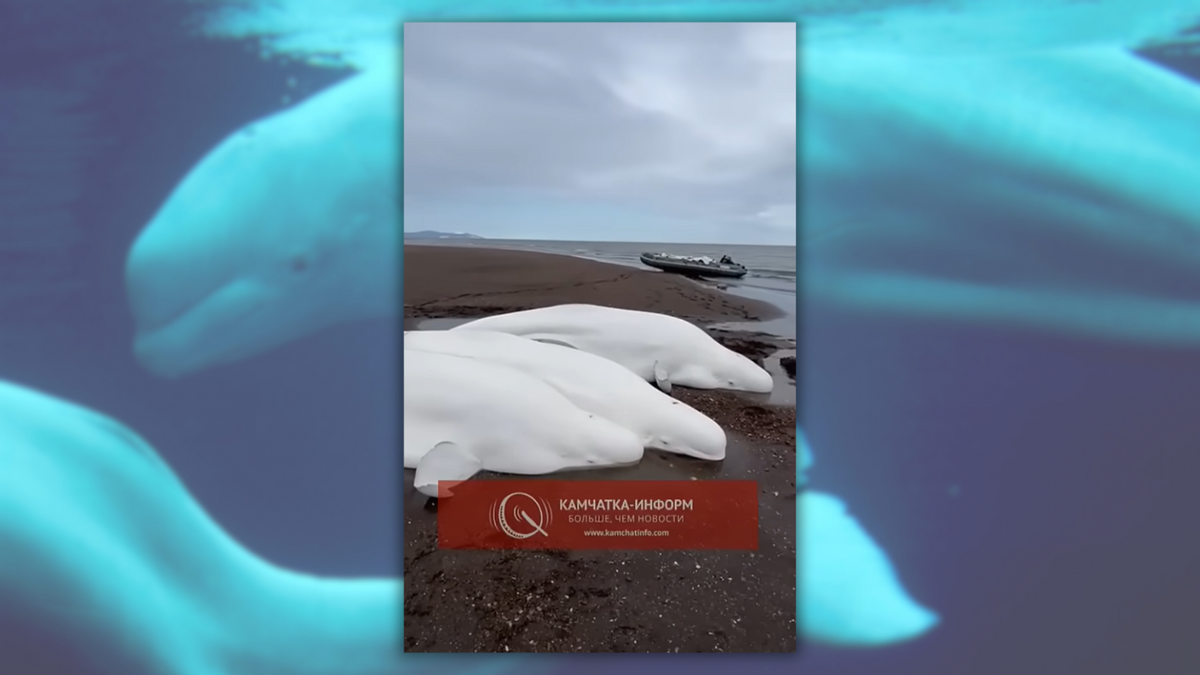Claim:
A video shared online in July 2025 authentically depicted belugas that beached themselves in Kamchatka, Russia, a day before an 8.8 magnitude earthquake rocked the region.
Rating:
Rating: Miscaptioned
Context:
The video shared in the claim was originally published on Aug. 13, 2023, nearly two years before the earthquake that struck the region on July 30, 2025.
Following a massive 8.8 magnitude earthquake near the peninsula of Kamchatka, Russia, in late July 2025, rumors that a family of five beluga whales beached themselves in the region one day prior circulated on social media. According to The Associated Press, the earthquake was one of the strongest ever recorded.
Posts sharing the claim included a video allegedly showing the beached mammals being tended to and ultimately rescued by Russian fishermen. The rumor was shared widely across X (archived, archived, archived, archived), with some users purporting that the whales’ actions represented some kind of warning of the oncoming natural disaster.
One person wrote on X (archived), “Nature always knows first. This was the warning.” Another user claimed (archived), “When the tide returned, all five swam back to the ocean after the earthquake.”
However, while the video of beluga whales beached on the shores of Kamchatka, Russia, appeared to be authentic, it was miscaptioned. Claims of a link between the beached whales and the earthquake, in other words, were misleading.
The video appeared online at least as early as Aug. 13, 2023, when it was published on the YouTube channel of local news outlet Kamchatka-Inform, with the title, “Kamchatka Residents Save Beluga Whale Family from Perishing” (translated from Russian).
Newsweek reported on the beached whales two days after the video was posted. It wrote, “The belugas, four adults and a calf, were found stuck on a beach near the mouth of the Tigil River in Russia’s Far East, local news outlet Kamchatka-Inform reported. The group of whales was rescued from their predicament by several local fishermen, who poured seawater on the mammals and kept them well fed with fish until the tide came back in.”
Additionally, Russian news outlet Pravda.ru reported on the incident at the time, embedding the same YouTube video.
While the video purported a happy ending for the beached whales, according to an article from the climate change website Green Matters, shared by the New Bedford Whaling Museum, beached whales “seldom survive,” even if rescued.
“It’s not entirely understood why, but it could be because the whale beached for a specific reason: either that he was sick, tired, confused, or could not swim,” the article stated. The beaching of whales is suspected to occur due to a variety of reasons; for instance, “changes in water temperature could be a cause of beachings, which means that whale beaching could be directly correlated to climate change and global warming.”
The article continued: “Other causes proposed include irregularities in whales’ echolocation and geomagnetic disturbances, but neither have been proven to the point of full clarity. In fact, the easiest reasons to accept why whales beach themselves are accidents: inclement weather, difficulty giving birth, hunting in too-shallow waters, and mistakes made in navigating.”
According to the Marine Mammal Stranding Center, a New Jersey-based nonprofit organization that rescues and rehabilitates beached mammals, including whales, the actions the fishermen in the video took to help the animals were not suggested.
“It is never recommended for the public to push a stranded animal back into the water,” the organization wrote on its website. “Not only is it dangerous for untrained individuals to attempt this, but these animals strand for a reason, and only pushing them back out into the ocean will prolong their suffering and any medical attention they might need. These animals are likely to re-strand in a different location and in a worsened condition.”
Sources:
– YouTube. https://www.youtube.com/watch?v=0CkQVke_im4. Accessed 30 Jul. 2025.
Fisheries, NOAA. “Responders Prepare to Help Entangled Cook Inlet Beluga Whale | NOAA Fisheries.” NOAA, 22 Nov. 2024, https://www.fisheries.noaa.gov/feature-story/responders-prepare-help-entangled-cook-inlet-beluga-whale.
Osmanski, Stephanie. “Why Do Whales Beach? A Deep-Dive Into What Causes Whales to Strand Themselves on Shore.” Green Matters, 22 Jun. 2020, https://www.greenmatters.com/p/why-do-whales-beach.
“Some Facts about the Strongest Earthquakes Ever Recorded.” AP News, 30 Jul. 2025, https://apnews.com/article/deadly-earthquakes-tsunamis-largest-24ba9c91359567e09016a38021f66f0f.
“Tsunami Evacuations Ordered in South America, but Worst Risk Appears to Pass for US after Huge Quake.” AP News, 29 Jul. 2025, https://apnews.com/article/japan-russia-kamchatka-earthquake-tsunami-warning-a88cbe8a1e985cff54dc0ad849ea5ddb.
“Tsunami Warnings Fading after One of the Largest Earthquakes Ever Recorded. Here’s What to Know.” AP News, 30 Jul. 2025, https://apnews.com/article/pacific-tsunami-warning-evacuation-4bf4cda5efc9dcc7bfdff736abf0f3af.
“Video Shows Russian Fishermen Rescuing Beached Beluga Whales.” Newsweek, 15 Aug. 2023, https://www.newsweek.com/beluga-whales-stranded-beach-rescued-fishermen-1819950.
Логинов, Олег. Рыбаки на Камчатке спасли выброшенных на берег китов-белух. 30 Jul. 2025, https://www.pravda.ru/news/accidents/1872849-staja_belukh/.
https://earthquake.usgs.gov/earthquakes/eventpage/us6000qw60/executive. Accessed 30 Jul. 2025.


